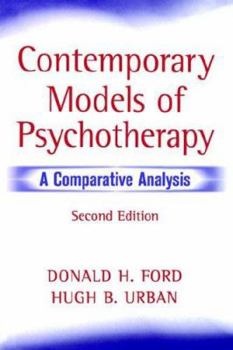Contemporary Models of Psychotherapy: A Comparative Analysis
From the reviews of the internationally acclaimed First Edition: "To view a variety of divergent systems in terms of a common framework is a task of no minor proportions. Ford and Urban have made this ambitious attempt and, in this reviewer's opinion, they have done so with considerable skill. This is an important book and constitutes a solid contribution to a field in which controversy abounds and in which there are few firmly established principles."--Contemporary Psychology "A valuable addition to our library shelves. It is well organized, well written, closely reasoned, and unafraid to tackle controversial issues. The authors, writing from the vantage point of the scientific method, are critical of, but not hostile to, psychotherapists. Each author has an active clinical practice, and they apparently represent the school of thought that believes 'researchers' and 'clinicians' need not be diametrically opposed."--The International Journal of Group Psychotherapy "The authors are to be congratulated on this book, a major contribution to the subject....Ford and Urban give an impression of scrupulous fairness. Credit is given when merited. Bouquets and brickbats are distributed impartially....This book should be read by all who teach and practice psychotherapy."--The Medical Journal of Australia "In all cases, original writings provide the source material for the authors' study....The exposition of the different viewpoints is free of bias and as a comparative study is eminently fair to the different schools of thought....No system has been singled out for obvious preference which would demonstrate a bias in the authors' thinking....The book is well written and the authors' style relaxed, yet the probing to the heart of each system of thought is unrelenting. This book should be read by all graduate students in clinical psychology, particularly, and therapists, in general, who wish to be aware of theoretical and therapeutic differences."--South African Journal of Science Thirty-five years ago, Don Ford and Hugh Urban, to the acclaim of critics worldwide, presented the psychotherapeutic community with its first systematic comparative analysis of all major psychotherapeutic theories. Since then, psychotherapy has experienced sweeping changes. The number of recognized therapeutic approaches now stands at over 400. Pressured by a results-minded public and increasingly budget-conscious insurers, today's therapists rarely adhere strictly to one approach; instead, they borrow freely from "whatever works." But, in the face of such a whirlwind of theories, jargon, and methodologies, how does one begin to decide what really works? Enter Contemporary Models of Psychotherapy, Second Edition. This thoroughly revised and updated Second Edition of Ford and Urban's 1963 classic does more than identify and compare today's most widely used approaches to psychotherapy. It provides therapists with a powerful analytical tool for looking beneath the surface of theories and for answering such crucial questions as: How are the different therapeutic theories similar and dissimilar? How can I tell a sound one from a faulty one? How do I decide which approach is more effective? Can different approaches be used for different problems? Can I successfully combine different approaches, and if so, how? In Section I, the authors explore the nature of theory construction and develop a rigorous analytical framework for comparing therapeutic systems. Representing a person as a unified structural/functional system, the framework interrelates all key biological, psychosocial, behavioral, and environmental aspects of human development and change. In Section II, Ford and Urban group the 400 approaches into eight families on the basis of their underlying metaphysical and existing logical assumptions: psychoanalytic; object relations, self-psychology, and interpersonal; humanistic/existential (including experiential, gestalt,
Format:Paperback
Language:English
ISBN:0471596388
ISBN13:9780471596387
Release Date:April 1998
Publisher:Wiley
Length:768 Pages
Weight:2.80 lbs.
Dimensions:1.6" x 6.4" x 9.5"
Related Subjects
PsychologyCustomer Reviews
0 rating





